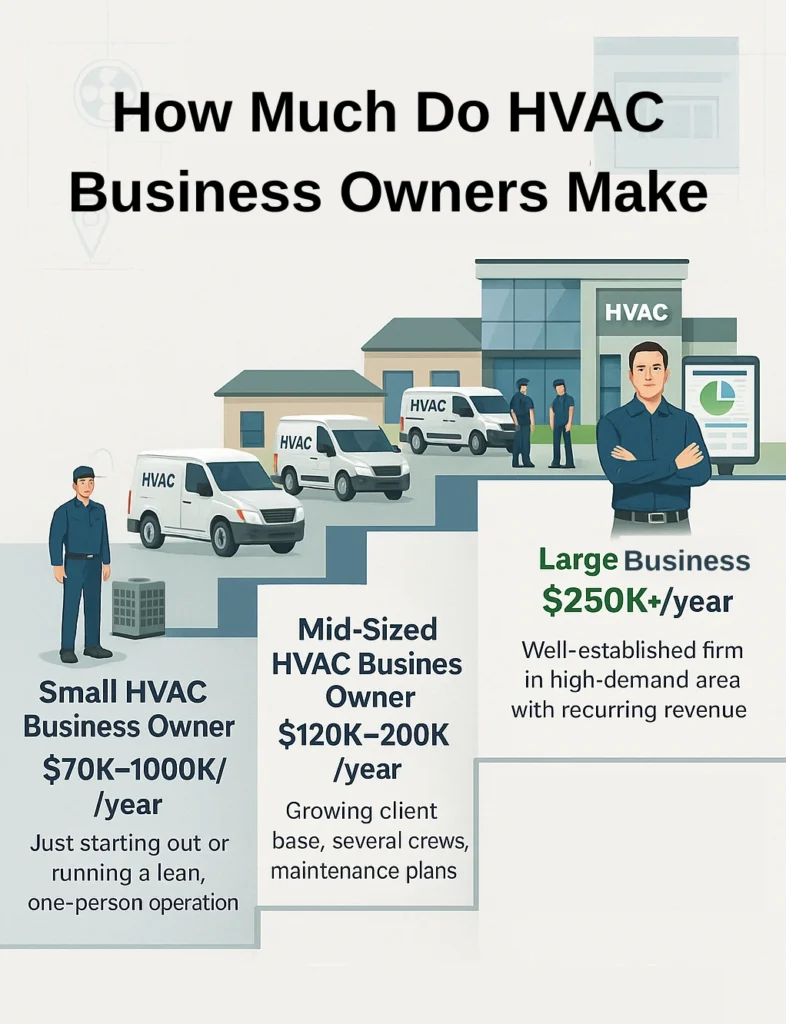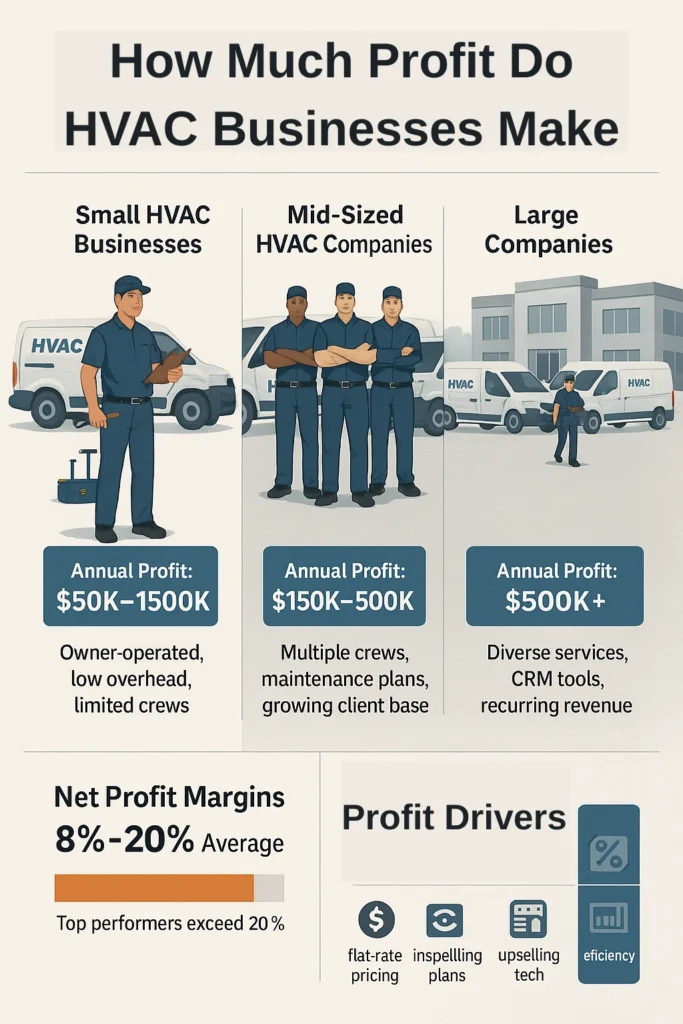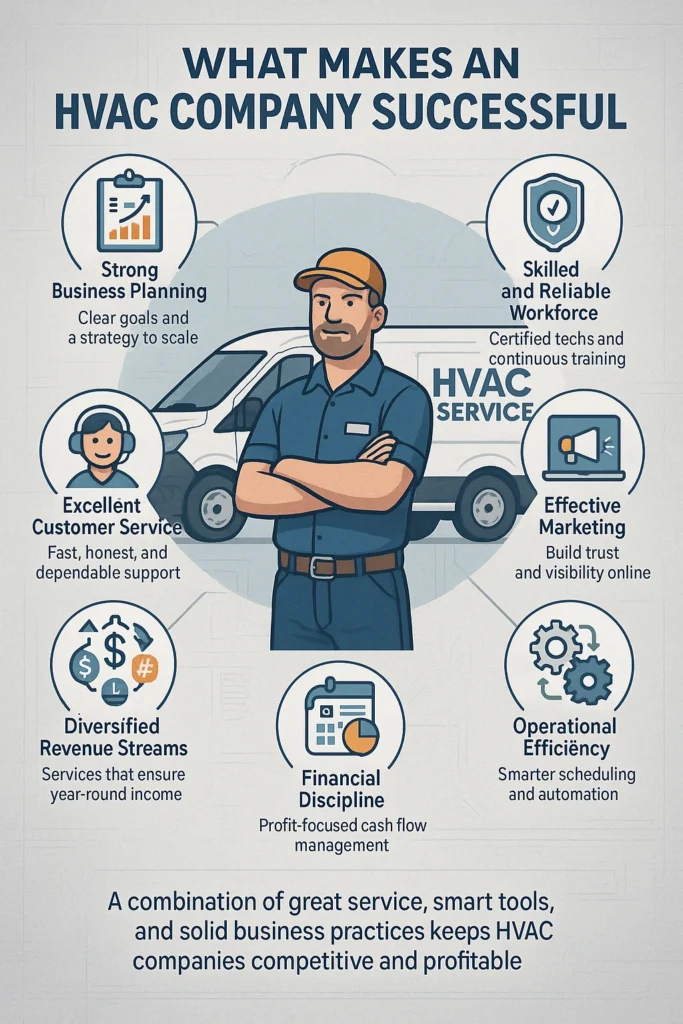Running a successful HVAC business involves managing a mix of skilled labor, customer service, seasonal demand, and evolving technologies. The industry is competitive, and business owners must constantly adapt to changing regulations, energy efficiency standards, and customer expectations.
From maintaining a reliable team to ensuring timely service and accurate pricing, HVAC companies face unique operational challenges that require both technical expertise and strong business acumen.
Key Takeaways
- Growing a successful HVAC business requires balancing technical expertise with strong business management and customer service.
- Profitability depends on efficient operations, effective marketing, and diversifying services to manage seasonal demand.
- Avoid common pitfalls like poor cash flow management and inadequate marketing for long-term success.
- Leveraging technology and automation tools can streamline processes, improve cash flow, and enhance customer satisfaction.
- Strategic planning, ongoing training, and financial discipline are the drivers for sustainable growth in the HVAC industry.
How Much Do HVAC Business Owners Make
The income of HVAC business owners can vary significantly depending on several factors, including the size of the company, geographic location, target market (residential vs. commercial), and how efficiently the business is run.
On the lower end, owners of small or newly established HVAC businesses may earn between $70,000 and $100,000 per year, especially if they’re still building a customer base or operating as a one-person team. As the business grows, with more technicians, service trucks, and recurring contracts, earnings can increase substantially.
Mid-sized HVAC business owners often earn between $120,000 and $200,000 annually, while owners of large, well-established firms in high-demand areas can make upwards of $250,000 or more.

How Much Profit do HVAC Businesses Make
The profit that HVAC businesses make depends on several variables, such as company size, service offerings, pricing strategy, overhead costs, and operational efficiency. On average, HVAC businesses operate with net profit margins ranging from 8% to 20%, though highly efficient and well-managed companies can exceed this range.
For small businesses, annual profits may fall between $50,000 and $150,000, particularly if the owner is actively involved in day-to-day operations and keeps labor and equipment costs under control. Larger companies with multiple crews, a fleet of service vehicles, and recurring revenue from maintenance contracts can generate profits well over $500,000 annually.
Profitability often improves as businesses implement strategies like preventative maintenance plans, flat-rate pricing, upselling smart home integrations, and investing in customer relationship management (CRM) tools to reduce missed appointments and improve service efficiency. Seasonal demand also plays a major role in HVAC profitability; businesses that diversify services, offering both heating and cooling year-round or adding plumbing and electrical services, can smooth out income and reduce downtime.

Why Do HVAC Businesses Fail
HVAC businesses can fail for a variety of reasons, often related to poor planning, mismanagement, or failure to adapt to market demands. Common reasons HVAC businesses fail include:
- Lack of Business Knowledge – Many skilled technicians start their own HVAC business without the necessary understanding of accounting, marketing, and operations management.
- Poor Cash Flow Management – Inconsistent billing, delayed payments, or underpricing services can lead to cash flow shortages that make it difficult to cover expenses.
- Inadequate Marketing Efforts – Relying solely on word-of-mouth or failing to invest in digital marketing can limit customer growth and brand visibility.
- Failure to Adapt to Seasonal Demand – HVAC is a seasonal industry; businesses that don’t plan for slower months may struggle to stay afloat during off-peak periods.
- Staffing Challenges – Difficulty hiring and retaining skilled technicians can impact service quality and limit business growth.
- Ignoring Customer Service – Negative reviews or poor communication can drive customers away and damage a company’s reputation.
- Lack of Technology Integration – Failing to adopt tools like scheduling software, CRMs, or mobile invoicing can lead to inefficiencies and lost opportunities.
Avoiding these pitfalls requires not only technical expertise but also strong leadership and a proactive approach to business management.
What Makes an HVAC Company Successful
A successful HVAC company combines technical expertise with smart business practices, consistent customer service, and the ability to adapt to industry trends. This is what makes a HVAC company successful:
- Strong Business Planning – Clear goals, defined service offerings, and a well-thought-out growth strategy provide direction and stability.
- Excellent Customer Service – Prompt communication, reliable scheduling, and transparent pricing help build trust and encourage repeat business.
- Skilled and Reliable Workforce – Hiring certified, experienced technicians and investing in ongoing training ensures high-quality service delivery.
- Effective Marketing – A strong online presence, local SEO, customer reviews, and targeted advertising attract new leads and build brand credibility.
- Operational Efficiency – Using tools like scheduling software, mobile invoicing, and CRM systems streamlines day-to-day operations and reduces costs.
- Diversified Revenue Streams – Offering services like maintenance plans, indoor air quality upgrades, and smart thermostat installations creates steady income.
- Financial Discipline – Monitoring expenses, pricing services appropriately, and managing cash flow carefully supports profitability and scalability.
These elements work together to help HVAC companies not just survive, but grow steadily and remain competitive in a demanding market.

Challenges that HVAC Businesses Face
HVAC businesses face a range of challenges that can impact profitability, growth, and day-to-day operations. Successfully navigating these obstacles requires both strategic planning and operational agility. Common challenges include:
- Skilled Labor Shortage – There’s a growing gap between the demand for qualified HVAC technicians and the number of trained professionals available, making hiring and retention difficult.
- Seasonal Revenue Fluctuations – Demand tends to spike during extreme weather months, while off-seasons can lead to reduced income and underutilized staff.
- Rising Operational Costs – Fuel, equipment, and insurance costs continue to rise, squeezing profit margins, especially for smaller companies.
- Technological Advancements – Keeping up with smart HVAC systems, energy efficiency standards, and evolving tools requires ongoing training and investment.
- Regulatory Compliance – HVAC companies must adhere to local, state, and federal regulations regarding safety, refrigerants, licensing, and environmental standards.
- Customer Expectations – Clients expect fast, affordable, and transparent service; failure to meet these expectations can lead to poor reviews and lost business.
- Competition – The HVAC industry is highly competitive, especially in urban areas, and standing out requires effective branding, marketing, and customer retention strategies.
How to Grow a HVAC Business
Growing an HVAC business involves more than just offering quality service, it requires a strategic approach to operations, marketing, and customer relations. To scale successfully, business owners should focus on the following areas:
- Invest in Marketing – Build a strong online presence through a professional website, local SEO, Google Business Profile optimization, and paid advertising to attract new customers.
- Offer Maintenance Contracts – Recurring service agreements create steady revenue and improve customer retention and keep clients engaged year-round.
- Leverage Technology – Use CRM systems, scheduling software, and mobile invoicing to streamline operations, reduce errors, and enhance the customer experience.
- Expand Your Services – Add complementary offerings like plumbing, electrical, or indoor air quality solutions to increase job volume and value per customer.
- Hire and Train Technicians – Build a reliable team, recruit skilled workers and provide ongoing training to ensure consistent, high-quality service.
- Monitor Financial Performance – Track metrics like profit margins, customer acquisition costs, and cash flow to identify growth opportunities and control expenses.
- Encourage Referrals and Reviews – Satisfied customers are your best marketers, ask for online reviews and incentivize referrals to boost credibility and reach.
With the right combination of systems, people, and planning, HVAC business owners can grow sustainably and remain competitive in an ever-evolving industry.
Grow Your HVAC Business with Natalie Luneva and DepositFix
Grow your HVAC business with the combined expertise of Natalie Luneva and the advanced automation features of DepositFix, a payment and invoicing platform designed specifically to simplify financial operations for service businesses.
Natalie, a trusted business advisor and growth strategist, brings valuable insights to help HVAC companies streamline their processes and unlock new growth opportunities. When paired with DepositFix’s powerful tools, HVAC business owners can save time, reduce errors, and improve cash flow while enhancing customer satisfaction.
Some of the features that HVAC companies will find especially helpful include:
- Automated Invoicing and Payment Reminders – Ensures timely payments and reduces manual follow-ups.
- Recurring Billing for Maintenance Plans – Simplifies management of ongoing service contracts with predictable revenue.
- Integration with Popular CRMs and Accounting Software – Seamlessly connects with tools like QuickBooks and HubSpot for smooth data flow.
- Online Payment Portal – Allows customers to easily view and pay invoices anytime, improving convenience and satisfaction.
- Customizable Payment Links – Enables quick, secure payment requests tailored to specific jobs or customers.
- Detailed Reporting and Analytics – Provides insights into payment trends and outstanding balances to help manage cash flow effectively.
With Natalie Luneva’s strategic advice alongside DepositFix’s automation capabilities, HVAC business owners can streamline operations, reduce administrative burden, and focus on growing their business. Book a 30-minute discovery call!

Conclusion
Growing and sustaining a successful HVAC business requires a careful balance of technical skill, strong management, and strategic growth efforts. While the industry offers lucrative opportunities, profitability depends on effectively managing operational challenges such as seasonal demand fluctuations, staffing shortages, rising costs, and evolving customer expectations. Business owners who invest in solid planning, build a skilled workforce, embrace technology, and maintain excellent customer service stand the best chance of thriving.
Leveraging tools like DepositFix to automate invoicing and payments, combined with expert guidance from professionals like Natalie Luneva, can further streamline operations and improve cash flow, allowing owners to focus on expanding their service offerings and reaching new clients.
FAQs
How can HVAC businesses improve customer retention?
Offering maintenance plans, providing excellent customer service, timely follow-ups, and using CRM tools to personalize communications can significantly improve customer loyalty and repeat business.
How can HVAC business owners handle cash flow challenges?
Maintaining clear billing processes, offering multiple payment options, automating invoicing with tools like DepositFix, and regularly reviewing financial reports help prevent cash flow issues.
How can HVAC companies handle late or missed payments?
Using automated payment reminders, offering flexible payment options like online portals, and setting clear payment terms upfront can help reduce late or missed payments.
What features should HVAC businesses look for in payment processing software?
Key features include integration with accounting and CRM systems, support for recurring billing, secure online payment options, customizable invoices, and detailed financial reporting.


